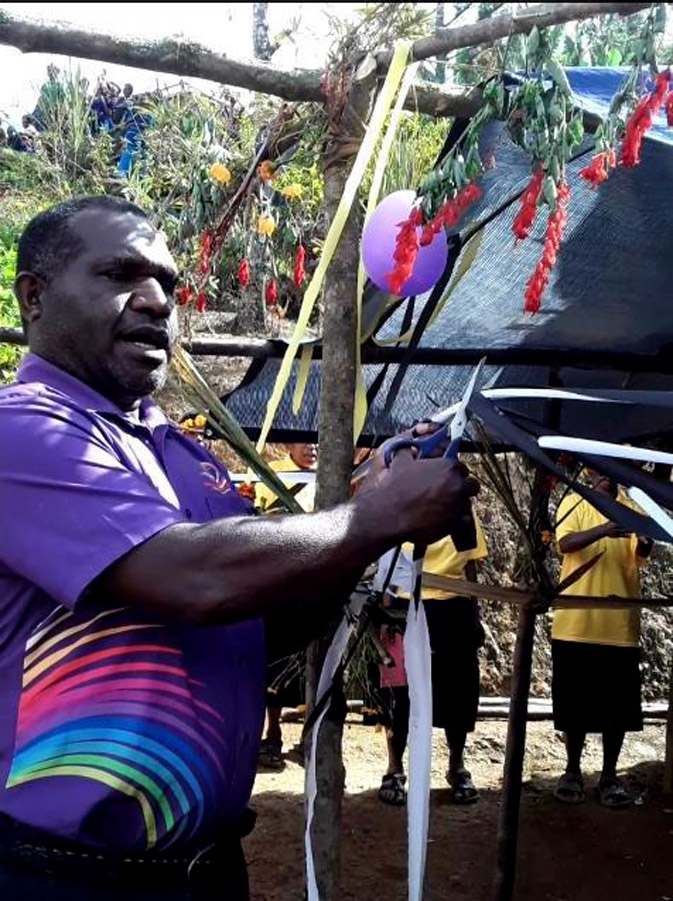Adult Literacy Graduation in the PNG Highlands
By Morrison Wiam, Project Officer in the Church Partnership Program
Anglicare PNG’s Morrison Wiam writes about a recent Adult Literacy graduation in Tsuwengai in the Jimi District of Papua New Guinea’s Jiwaka Province.
On his journey from Mt Hagen, Morrison was joined by five others, including Anglicare PNG Adult Literacy Officer, George Welek, Anglicare Branch Manager, Ruben Fuafo. To get there, they travelled via four-wheel drive vehicle from Mt Hagen, and on then foot through the foothills of the Bismarck Ranges.
In spite of the COVID-19 pandemic, 38 adult learners and two teenagers graduated from their literacy and numeracy course this year. These graduates came from three Adult Literacy Schools in the Jimi District. Thousands came to witness the graduation.
It is worth noting that Adult Literacy Schools are now beginning to expand to ever more remote and marginalized communities which have long been neglected by the formal education sector, thanks at least in part to Anglicare and the Anglican Church of Papua New Guinea.
At the graduation, both government and church leaders were in attendance. Ruben Fuafo gave the keynote address and cut the ribbon to open a newly-constructed classroom made from Kunai leaves. Forty learners had completed the first four books of “Kisim Save” (Knowledge) and graduated with certificates as well as a bible.
Most (36) were female and there were four males. Among them were two teenagers (aged 13 and 15). Of the 40, seven were selected to attend four church-run primary schools in Kombaku, Bokopai, Kombiai and Koinambe to further their education.
Twenty-four others were invited to join Mothers Union to work in three different locations. Eight more were invited to serve their church communities, some as assistants to parish councillors and some as church-wardens. One graduate was invited to assist the Adult Literacy teacher at Tsuwengai Adult Literacy School.
Many people had contributed to the students’ success – hardworking teachers, committees, the learners themselves, their families, and communities.
I later reflected on the walk into the village: We slowly climbed the hill. We were at a higher altitude, and as the air pressure got thinner, the wind blew in every direction and the humid air created a lower and more inviting temperature. We could hear the wind buzzing in the leaves, with the grasses and trees swaying back and forth rhythmically, making us feel uncomfortable as we went up and down on the narrow track. We were in face reaching one of the most beautiful spots in the world.
From mountain to valley, we watched the ordered fields of the Jimi Valley slowly drop down and up the untouched mountain bordering Madang and Jiwaka Provinces. We saw food gardens, pit-pits, sugar cane and taro gardens along the roadsides as we walked past the rutted muddy road. Increasingly we saw coffee gardens, and I wondered how this coffee reaches town for marketing.
After five hours of walking, we reached Tsuwengai. Traditional dancing groups, youths, leaders and graduates were all there to welcome us. I thought these were some of the world’s friendliest people. They were overjoyed, and you could hear the roaring of their shouting in all corners of their small but beautiful village.
Wearing yellow collar-shirts and black skirts, the graduates took us all the way to the resting area where we were formally received by the leaders, youths and women and were honoured by welcome speeches.
As I reflected on the difficulty of walking into the village, I realised that these people really need better basic services.
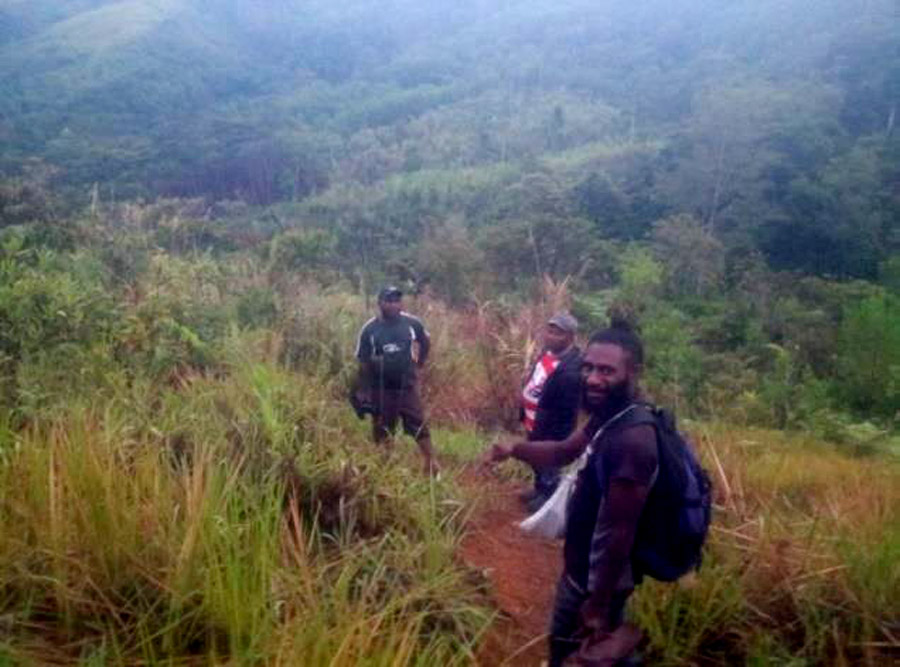
The visitors (Morrison is in the middle of the three walkers) left at three in the morning to walk into the village. ©Morrison Wiam, Anglicare PNG
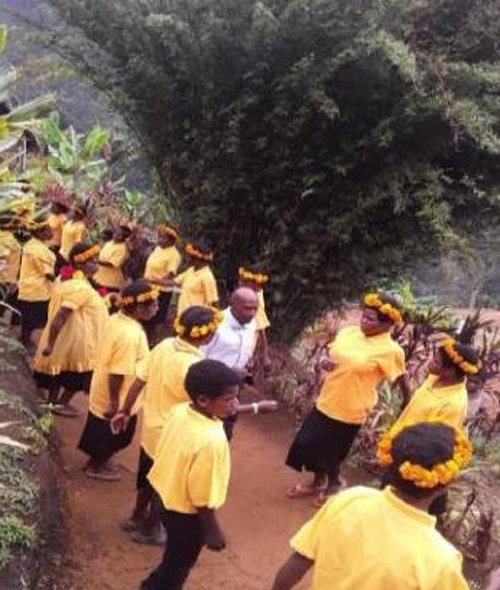
Graduates in yellow shirts and garlands welcomed the visitors. ©Morrison Wiam, Anglicare PNG
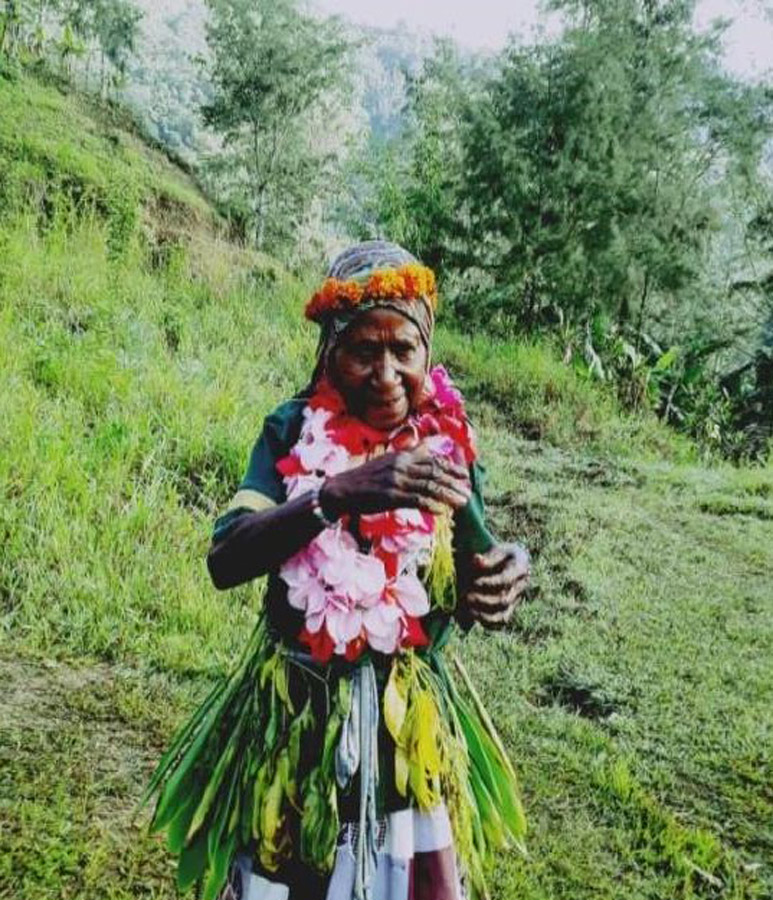
A traditional welcome was given at the entrance to the village. ©Morrison Wiam, Anglicare PNG
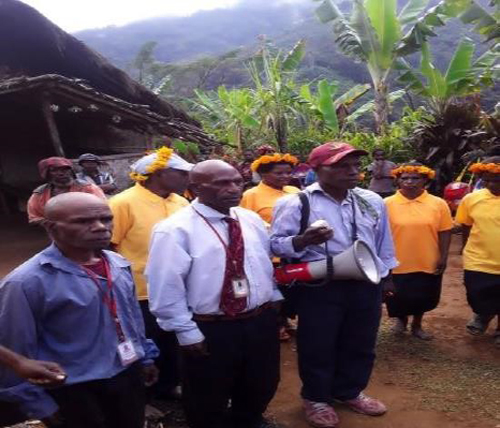
Teachers and Learners waiting to receive the visitors. ©Morrison Wiam, Anglicare PNG
